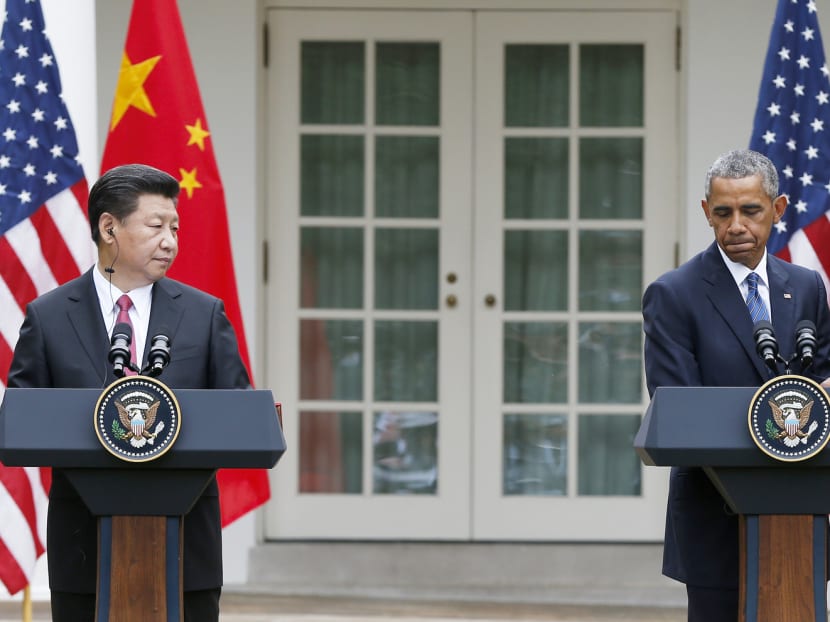US targets Chinese companies in cyber feud
WASHINGTON/SAN FRANCISCO — Three state-owned Chinese companies benefited from trade secrets stolen in a Chinese military hack on American companies, the authorities in Washington have concluded, heightening the tension between the two countries over cyberespionage.

President Barack Obama during a joint news conference with Chinese President Xi Jinping in the Rose Garden of the White House during Mr Xi’s state visit last month. During his visit, Mr Xi promised that China would not engage in commercial cyberspying. Photo: AP
WASHINGTON/SAN FRANCISCO — Three state-owned Chinese companies benefited from trade secrets stolen in a Chinese military hack on American companies, the authorities in Washington have concluded, heightening the tension between the two countries over cyberespionage.
People familiar with last year’s US indictments of five People’s Liberation Army (PLA) officers named the companies as Chinalco, the biggest aluminium company in China, Baosteel, a large steelmaker, and SNPTC, a nuclear power company.
The companies had been unnamed parties in those cases, which accused the Chinese officers of launching cyberattacks, these people said.
US President Barack Obama’s administration has threatened to slap sanctions on companies that benefit from such hacks, saying economic cyberespionage was “an act of aggression that has to stop”.
If the US were to include the three companies in cybersanctions, it would represent an escalation, given their central role in the Chinese economy.
Chinalco spokesman Yuan Li said he was unaware of US commercial espionage allegations against his company. “Chinalco is a very responsible firm in these matters,” he said.
Baosteel and SNPTC were not immediately available on Wednesday, the last day of a week-long national day holiday in China.
The US has several options when imposing sanctions, from travel bans on executives to requiring US banks to freeze the assets of sanctioned entities. The latest claims come at a time when China’s government is trying to allay US concerns about economic cyberespionage. Last month, during his first state visit to the US, Chinese President Xi Jinping promised that China would not engage in commercial cyberspying.
In April, Mr Obama issued an executive order allowing for the first sanctions based on cyberattacks that threaten the US economy or national security. The willingness to punish cyberattacks comes after an alarming rise in hacks, with the Federal Bureau of Investigation recently attributing a 53 per cent jump in cybereconomic espionage cases to China.
US law enforcement officials say many Chinese firms rely on stealing information from US rivals to help sell goods more cheaply, produce products more quickly or accelerate innovation, which hurts US companies.
The victims of the PLA hack were named as Westinghouse Electric, the US subsidiaries of SolarWorld, US Steel, Allegheny Technologies and Alcoa, as well as a steel and manufacturing union.
The Chinese companies have been lead negotiators in international trade and investment deals, where advance knowledge of bargaining points could give them an advantage. All are also involved in international partnerships and are big importers.
Baosteel is the country’s largest listed steelmaker and is one of the most influential state-owned companies in Shanghai.
Chinalco is a politically important group whose chairman Ge Honglin is a senior member of the Chinese Communist Party. The company cooperated with Alcoa in 2008 to buy a stake in Australian miner Rio Tinto, thereby blocking Rio’s merger with fellow Australian miner BHP Billiton.
SNPTC’s primary role is to develop nuclear reactor technology transferred to China by Westinghouse, which is now owned by Toshiba of Japan; it is also a partner with Westinghouse in a bid for a reactor project in Turkey.
Mr John Carlin, the cybersecurity official at the Department of Justice, restated the US threat of sanctions for hacks on Tuesday, saying that the US would pursue Chinese hackers if it believed they were engaging in corporate cyberespionage.
“If we see cyber-enabled theft of commercial information to be used against those (US) companies, we will take action at a time and place of our choosing,” said Mr Carlin, who declined to comment on the alleged Chinese companies that benefited from the PLA hack. FINANCIAL TIMES






